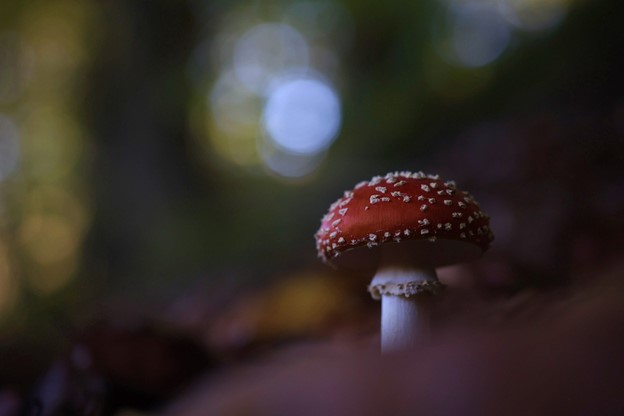Image:Pixabay
What if you went to a therapist for help with depression, and they said, “Would you be willing to try magic mushrooms?” Well, they might not say that exactly. But they may suggest psilocybin, the active ingredient in “magic mushrooms.”
By Indiana Lee

Psilocybin is moving up the list of viable treatment options for medically resistant anxiety, depression, and PTSD. Before we discuss the future of psilocybin in treating mental illness, let’s briefly touch on where it's been.
Where Did Therapeutic Psilocybin Come From?
Albert Hofmann identified psilocybin in magic mushrooms in the late 1950s. From there, doctors, psychologists, and psychiatrists entered into years of research on the effects of psychedelics in treating mental health and physical ailments.
However, by the late 1960s, government officials cracked down on the use and research of psychedelics, eventually stopping it entirely. And by 1970, psilocybin was deemed a Schedule 1 controlled substance according to the Controlled Substances Act.
In the mid-1990s, psychedelic research and its use in the medical field were revived. And psilocybin, as a serious treatment for medically resistant mental illnesses, has since taken off.
Doctors, researchers, and mental health professionals are proving the potential of psilocybin in treating pain and alleviating the symptoms of varying mental health conditions. As a result, people are becoming less scared and judgemental of it and more open to its medical use, at the very least.
Embracing Synthetic Psilocybin
While natural psilocybin is derived from fungi, synthetic psilocybin is created by scientists in a controlled setting like a lab. Elements of the natural psilocybin are combined to produce a nearly identical substance that can thrive outside of where it would be naturally made.
The most significant benefit of synthetic psilocybin is that scientists control how it’s produced. They can manipulate, change, use, and understand psilocybin in ways that aren’t possible with natural psilocybin.
That said, natural psilocybin produces the mystical, magical experience often associated with taking mushrooms. This kind of experience opens people’s minds. It allows them to see the world and their life from an elevated perspective—something so crucial to adopting new behaviors that could positively impact their journey with mental health challenges.
The Production Concerns
Those on the production end of pharmaceutical psilocybin, in particular, face an uphill battle. Producing and distributing the substance is an intricate process that will take years to come to full fruition, let alone it becoming widely accepted in healthcare and among the public. Here’s why.
FDA approval is slow
Yes, we’re close to getting FDA approval for some psychedelic treatments. The FDA granted psilocybin a Breakthrough Therapy designation in 2018, and many clinical trials are underway to prove its safety and efficacy in mental health treatment.
That said, there aren’t any psilocybin medicines with current approval from the FDA, even with their expressed support of the substance. This may change soon. But what won’t is psilocybin’s designation as a controlled substance.
As long as psilocybin remains illegal federally, it’ll be difficult to consistently get the funding and support needed to back clinical research and human trials and move FDA approvals along.
Separating the good from the bad
People flock to “magic mushrooms” because of the mystical experience we mentioned above. However, what often comes with that experience is hallucinations. Hallucinations can be frightening and trigger harmful behaviors in the people having them.
This is the last thing patients with severe mental illnesses need. So, the concern lies in whether scientists can remove the hallucinatory aspects of psilocybin or separate them from the therapeutic properties.

In addition, can scientists eliminate the qualities in psilocybin that lead to harmful side effects like acute hypertension, the potential for addiction, and decreased therapeutic effects with repeated use?
Separating the good from the bad is critical in producing effective psilocybin medication and treatment.
Dosage, Where Patients Are Dosing, and Who’s Involved Must Remain a High Priority
How psilocybin is sourced, made, and distributed is obviously critical to its future success. But the recommended dosage, where patients dose, and who’s involved in the process is just as vital.
Pharmaceutical manufacturers can’t mass-produce synthetic psilocybin pills, hand them over to medical professionals, and say, “have at it.” There need to be strict yet clear guidelines for dosage, first and foremost. How much should a patient take, and how often.
There also needs to be strict guidelines for where the treatment is administered. For example, many people partake in micro-dosing at home, taking a fraction of a regular dose of psychedelic substances.
But even as it becomes more widely used, micro-dosing isn’t the most effective route to consuming psilocybin with the purpose of making a mental illness more manageable. It’s much safer for a patient to be treated with psilocybin in a controlled environment, overseen by a mental health professional certified in conducting this particular treatment.
Finally, manufacturers need to be extremely transparent about the potential side effects of psilocybin. It won’t work for everyone, and it will do different things for different people. Patients need to understand this in detail before ever embarking on such a treatment journey.
Conclusion
Many would say the future of synthetic psilocybin for mental illness treatment is bright.
We have a long way to go before psilocybin is decriminalized and publicly accepted as a positive, safe substance. But researchers, scientists, medical staff, and mental health professionals worldwide are fighting to make this happen.
Pharmaceutical Microbiology Resources (http://www.pharmamicroresources.com/)



No comments:
Post a Comment
Pharmaceutical Microbiology Resources